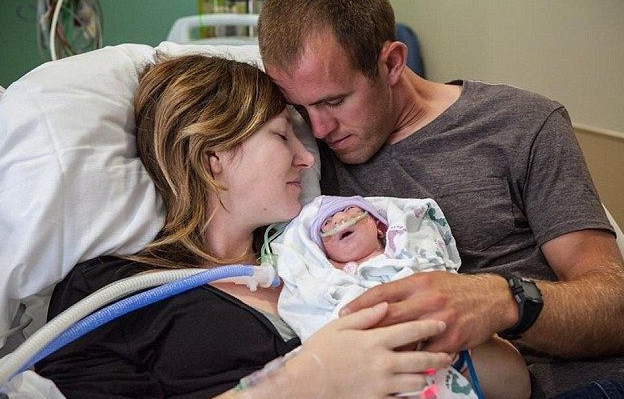(单词翻译:单击)
Abbey Ahern, 34, who lives in Oklahoma, was devastated when she was told at her 19-week scan that her daughter had the terminal illness anencephaly which meant she would not live beyond a few hours.
居住在美国俄克拉荷马州、今年34岁的艾比·阿埃伦在怀孕19周的时候,在被告知腹中的女儿被诊断出患有先天无脑畸形绝症、意味着仅能存活几个小时的时候,她彻底崩溃了。
According to the National Institutes of Health, the defect means the baby has an underdeveloped brain and incomplete skull.
美国国立卫生研究院表示,该缺陷意味着婴儿的大脑和头骨都无法发育完全。
Approximately one in 10,000 babies in the US are born with anencephaly, most of which result in miscarriage.
该缺陷在美国的患病几率是一万分之一,大多数都会导致流产。
As a result, Abbey and her pilot husband Robert, also 34, decided to have a live birth so that they could spend time with their daughter and donate her organs - making Annie the first infant newborn donor in the state.
艾比和她34岁的飞行员丈夫罗伯特最终决定将女儿生下来,这样他们可以陪伴女儿仅能存活的几个小时,同时,他们也决定捐献女儿的器官,这也是该州新生儿捐赠器官的第一例。

Afterwards they asked the doctor for the gender of their unborn child and decided to name her on the spot. They named her easily: Annie, which means, "grace."
他们向医生询问了这未出世孩子的性别,并给她取了名字。他们给她取名安妮,寓意着“恩典”。
Abbey told: 'Carrying a terminally-ill baby to term was by far the most difficult thing I have ever done... For us, even in the midst of our terrible heartbreak we were able to see so much beauty.'
艾比告诉记者:“生下这个患有绝症的孩子是迄今为止我做过的最困难的事情。对我们来说,虽然会感到心碎,但我们也看到了女儿的美丽。”
The family spent just 14 hours and 58 minutes with Annie before she passed away.
全家人在安妮夭折前仅与她相处了14个小时58分钟。
Her organs were not viable for transplant because her oxygen levels were too low - which Abbey said was 'disappointing' - but they were able to donate her heart valves and some of her organs could be used for research.
最终,安妮的器官因为氧含量太低而无法移植,艾比表示这太“遗憾”了,但他们能够捐赠她的心脏瓣膜,她的一些器官也可以用于研究。
She said: 'Annie's story is one of hope. I think it shows people that in the midst of tragedy, there can be beauty.
艾比说:“安妮的故事象征着希望。我认为它表明人们在悲剧中仍然可以看到美的存在。”


